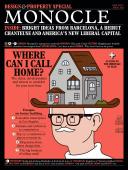
Issue 103
Design and property special. Inside: bright ideas from Barcelona, a Beirut chanteuse and the US’s new liberal capital.
In This Issue
Oops! No content was found.
Looks like we no longer have content for the page you're on. Perhaps try a search?
Return Home

